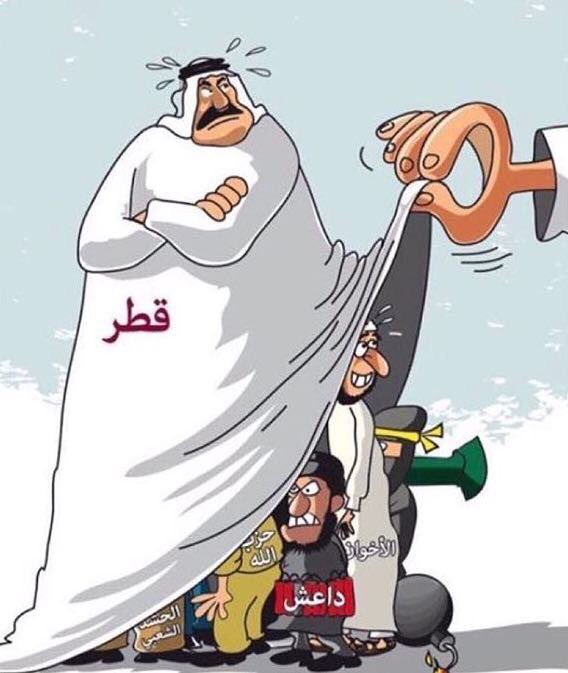In its first decades of oil growth, Qatar’s relationship with Muslim Brotherhood exiles was similar to that seen in neighboring Gulf States, who, in need of staff for their nascent education and judicial systems, welcomed Brotherhood sympathizers and members seeking refuge from Gamal Abdel Nasser’s Egypt.
Since that period in the 1950s and 1960s, these states’ political stances toward local Muslim Brotherhood groups have changed drastically, illustrating the degree to which Brotherhood affiliates have become increasingly nationalized, and the way each Gulf regime considers the local Brotherhood threatening the internal security and stability.
As a whole, government treatment of these organizations in the GCC seems to vary according to the level of political participation allowed and the degree to which regimes consider them linked to terrorist groups whether inside or outside these countries.
The Muslim Brotherhood thus is seen as a terrorist threat in the systems of Saudi Arabia and the UAE where Brotherhood-linked individuals participated in calls for jihad and supporting chaos witnessed in a large number of Arab countries during the so-called Arab Spring.
Qatar-Brotherhood deal
However, the other states which selectively co-opt or work alongside, rather than shut down, Brotherhood movements tend to feel less threatened by them not only domestically, but also abroad – as seen in the Qatari case.
The Qatari Brotherhood, which formally chose to dissolve itself in 1999, tended to focus on social policy rather than political reform. Indeed, the organization never formed a political arm and primarily organized social and educational events. Today, lacking the means to disseminate its ideology through an official publication or even a formal meeting place, the Qatari Brotherhood does not appear to harbor ambitions beyond continuing intellectual and spiritual pursuits.
Possibly because of the lack of a political opening – and partly due to general satisfaction with the prevailing system – the Islamist sector in Qatar has not become politically active in any type of reform movement.
Further, because the government has been public about the need for democratic reforms, there is less space for Brotherhood, or other, agitation in this field. This non-confrontational relationship has led the government to be more accepting of the Brotherhood – both at home and abroad.
Only Abroad
The Qatari government has backed Islamist movements overseas, to a large extent, to advance the country’s influence globally, rather than to promote a specific ideology. Indeed, if the Qatari government truly hoped to bolster Islamist ideology, it would do so domestically. Qatar’s willingness to engage with the Brotherhood abroad is instead closely linked to its desire to distinguish itself from Saudi Arabia.
Qatar’s policies during the Arab Spring, at the root of the first GCC spat in 2014 and a contributing factor to this second crisis, further separated it from neighboring Gulf States, which were considered to be leading a counter-revolution against the region’s popular revolts.
Taking a proactive stance, Qatar was the first country to grant official recognition to the rebel-led Libyan National Transitional Council, hosted a meeting for the Libya Contact Group, and sent six fighter jets as part of the NATO-led no-fly zone in March 2011.
Qatar also stirred controversy in its backing of Libyan Islamists, as it hosted several key Islamist figures, primarily those from the Libyan Islamic Fighting Group (LIFG), most prominently Ali al-Sallabi. The link with al-Sallabi, who has lived in Qatar for nearly 10 years, and his brother Ismail, who also fought with Qatar-funded militias in Libya, is “probably personal more than ideological”.
Clearest Evidence
Qatar’s backing of Mohamed Morsi’s Brotherhood-led government in Egypt from June 2012-July 2013 was considered the clearest evidence of its Islamist leanings. During the year that Morsi was in power, Qatar gave or lent $7.5bn to Egypt. Still, Qatar maintained its support not for the Muslim Brotherhood per se, but rather for a popularly elected Egyptian government.
Since the fall of Morsi in July 2013, the Egyptian regime under President Abdel -Fattah Al-Sisi has suspended negotiations on the purchase of Qatari natural gas, in addition to returning $2bn that Qatar had deposited into the state’s central bank under Morsi’s tenure, following Qatar’s postponement of granting the aid and its imposition of new conditions for its receipt.
Regardless of whether the Brotherhood is banned inside the Gulf, Qatar will remain supporting Muslim Brotherhood under the current regime. Also the Gulf states will continue to harbour suspicions of the Brotherhood for three primary reasons; including its extremist ideology, and its relations with the extremist groups working in all over the region.







































admin in: How the Muslim Brotherhood betrayed Saudi Arabia?
Great article with insight ...
https://www.viagrapascherfr.com/achat-sildenafil-pfizer-tarif/ in: Cross-region cooperation between anti-terrorism agencies needed
Hello there, just became aware of your blog through Google, and found ...